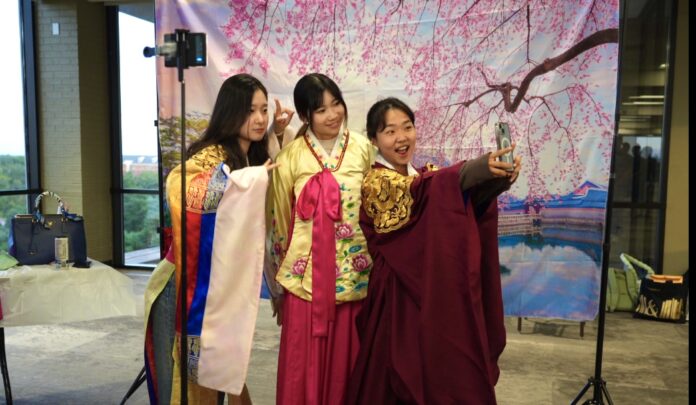
By Emma Weidmann | Arts and Life Editor
The Korean Student Association at Baylor hosted the Korean Culture Festival Friday night on a bigger scale than ever before.
To open the event, nanta drums were played, filling the room with a powdery fog as the mallets hit. It was loud enough to be felt in your chest like a heartbeat — an exciting and fitting opening ceremony.
Dallas junior and KSA president Amy Kim said she is proud to bring a large-scale event to campus to represent Korea, as KSA was the only Asian group on campus without a major cultural festival.
“Korea didn’t [have a big event] because we might have been a smaller country back then,” Kim said. “It’s just the fact that we got to be a group where we can promote our culture and have people come who want to learn more about it.”
Dallas junior and KSA event chair Jeena Yoon said being able to spread Korean culture to a broader audience has been a highlight of coordinating the festival.
“Especially in a city like Waco where the majority of people are not Korean, it’s important for us as KSA to [host the event] because that’s our whole role here — just to have the community experience Korean culture in a way where they normally wouldn’t be able to,” Yoon said.
Yoon noted that while KSA’s goal throughout the semester is to “provide a sense of home” to Korean students, the Korean Culture Festival has a different aim.
“These events that we do, that’s where we try to hit the community in order to showcase our culture as a whole, where it may not be known other than generic K-pop,” Yoon said.
This year marks the first time KSA has hosted the event in tandem with Korean language classes. This growth lended more educational opportunities and hands on deck than ever before, helping bring the event to more students.
Korean language students created booths that were scattered throughout Cashion 506. Attendees could learn to read Hangul, the written Korean language; weave their own Norigae, a decoration for traditional clothing; and play Jegichagi, a traditional game similar to hacky sack.
Halfway through the event, the floor opened for a K-pop dance competition. Dance groups formed by Baylor students showcased their talents and competed for prizes. But it wasn’t all modern — following the hip-hop and fusion-inspired dances was a glimpse into the traditions of Korea.
Yoon said the inclusion of both K-pop dances and traditional dances helps demonstrate that there is more to Korea than its entertainment value.
“Showing that we’re deeper than K-pop and entertainment purposes is also our duty as Korean people,” Yoon said. “We want to highlight what’s popular and what we are proud of currently, and that’s our entertainment side, I think. … But at the same time, highlighting our roots and our traditional history is also important when we’re trying to accelerate Korean culture as a whole.”

